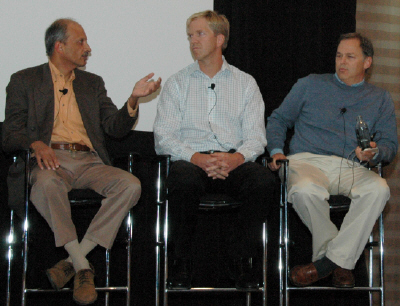Venture capitalists weigh in on Office 2.0

The final panel at the Office 2.0 conference focused on the venture capital angle, which is tightly bound with what enterprises and consumers are looking to buy. M.R. Rangaswami of the Sand Hill Group, which recently held a conference attended by CIOs from Wal-Mart, Toyota, Nike, Phizer and other major corporations, said that IT executives are not looking for cool technologies. "CIOs are saying show me how I can innovate and solve business problems as opposed to cool new spreadsheets," Rangaswami said.
A lot of the conversation at the conference is about how and not what," said Peter Rip of Leapfrog Ventures. "It's what kinds of tools and products are going to be in enterprise, and what problems they are going solve."
Rip added that traditional enterprise software is not going away soon. "[Office 2.0] has to solve real problems--they have to have process integration and domain knowledge, and need flow and context, which is the missing gap in enterprise software today." He gave an example of a SaaS application with embedded document creation and approval management on top of a domain specific activity.

M.R. Rangaswami (Sand Hill Group), Gordon Ritter (Emergence Capital Partners), Peter Rip (Leapfrog Ventures)
Gordon Ritter of Emergence Capital Partners, an early investor in salesforce.com, said that he evaluates SaaS plays on how quickly customers can get immediate business value out of a service. I spoke to him after the panel about salesforce.com's AppExchange and Apex platform. He thinks that smaller development companies can do well selling niche applications and components into the salesforce.com ecosystem. Companies developing enterprise applications, such as human resource management or financials, would want their software to run on multiple platforms, not just salesforce.com's Apex, Ritter said.
Gus Tai of Trinity Ventures agreed that developers who want to build a big business aren't going to want to put all their eggs in the salesforce.com basket, but should look at other ecosystems, such as WebEx Connect. "Find the next ecosystem if want to be a big business and you want venture money. We need other ecosystems and places to go to get leverage in the market," Tai said.
The software industry is at an inflection point, in which SaaS platforms like salesforce.com's Apex will increasingly attract communities of developers. David Berlind wrote about this shift this post:
Apex is a language that is optimized for developing applications that run on and are hosted by salesforce.com. Java is not. Nor are the others. In fact, what do you get when marinate Java with some salesforce.com specific SQL calls in order to make it easier to build salesforce apps? Apex. In the bigger scheme of things, when you consider how staying with one of the other all purpose languages would probably have done very little to fix the lock-in problem (see my earlier arguments), but how it might have sacrificed some of the optimizations that empower developers to more quickly and easily harness the salesforce platform, salesforce.com ultimately made the right choice for itself as well as its customers. Can use of Apex end up locking you in? Absolutely (at least until other SaaS outfits embrace it…. if salesforce.com lets them). Does salesforce offer an alternative route should you wish to mitigate that risk. Yes. Is the world of computing as we know it evolving right before our eyes? Absolutely.